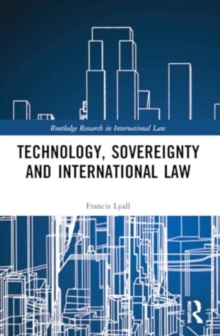Description
| Product ID: | 9781032226194 |
| Product Form: | Paperback / softback |
| Country of Manufacture: | GB |
| Series: | Routledge Research in International Law |
| Title: | Technology, Sovereignty and International Law |
| Authors: | Author: Francis Lyall |
| Page Count: | 222 |
| Subjects: | Writing and editing guides, Technical writing, Political structure and processes, Indigenous people: governance and politics, Economics, Transport industries, Transport industries, Jurisprudence and general issues, Legal skills and practice, Legal history, International law, International law, transport: space and aerospace law, International law, transport and commerce: maritime law, Constitutional and administrative law: general, IT and Communications law / Postal laws and regulations, Technology: general issues, Environmental science, engineering and technology, Marine engineering, Political structure & processes, Regional government, Economics, Shipping industries, Aerospace & air transport industries, Jurisprudence & general issues, Legal skills & practice, Legal history, International law, International space & aerospace law, International maritime law, Constitutional & administrative law, IT & Communications law, Technology: general issues, Environmental science, engineering & technology, Marine engineering, USA |
| Description: | The book analyses the ongoing attempts to balance state equality, measures adopted by new institutions to secure comprehensive representation, and ends by looking to the future of state sovereignty in an increasingly globalised world. The dogma of the sovereignty of the state, deriving from the Peace of Westphalia, underpins much of the modern-day international system. However, developments in recent technology have led this ideology to depart from reality. Viewing state sovereignty through the prism of public international law, the book will begin with an overview of the settlement of Westphalia, how it has influenced international documents ever since, and how the advantages of centralised decisions came to be perceived. By surveying the Law of the Sea, Maritime Law, Air and Aviation, Telecommunications, Postal Services, Space Law and Mensuration, the book demonstrates how, in each, the interplay between state sovereignty and developing technologies have caused significant legal change. Some changes, Lyall argues, such as international measures of time and geography, have been born out of convenience, facilitated by technology developed for the purpose. Other areas of change developed out of a desire to reconcile conflicts or harmonise necessary state regulation. The book analyses the reasons behind these changes and discusses the ongoing attempts to balance state equality, measures adopted by new institutions to secure comprehensive representation. It ends by looking to the future of state sovereignty in an increasingly globalised world. The book is of use to any student or scholar interested in policy making, international law and international affairs, both legal and scientific, as well as those looking at legal administrative issues and government officiation. |
| Imprint Name: | Routledge |
| Publisher Name: | Taylor & Francis Ltd |
| Country of Publication: | GB |
| Publishing Date: | 2024-01-29 |


